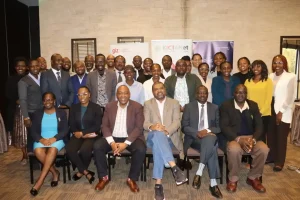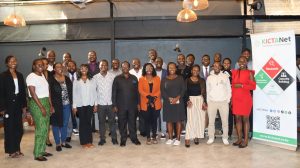Kenya is a land of beautiful landscapes, vibrant culture, and rapidly expanding internet access. However, behind all this is a public shying away from lifting a finger against questionable digital freedoms. So questionable and uncertain that expressing even a mildly critical opinion might land you in a dungeon.
I speak of the freedom where you’re told you’re “connected” but feel more like you’re under a microscope – stained and mounted for observation.
A while back, KICTANet, in collaboration with APC, CIPESA and CIPIT, submitted a comprehensive Joint Stakeholder Report to the Universal Periodic Review (URP). The report highlighted this nuanced state of digital human rights, making us question why we’ve got all this internet penetration and access – like the digital Silicon Savanna that we are – but, and still, feel like it is a blessing in disguise.
Because let’s be real. The Computer Misuse and Cybercrime Act (CMCA) 2018 was supposed to be our digital guardian, a knight in shining armour, right? But is it? Or is it more like a digital sieve, catching only the inconvenient truths while letting everything else slip through?
With the recent heightened surveillance, can we say that Kenyans are enjoying their freedom of privacy as provided in the Act mentioned above? I mean, I’m sure whoever the “surveillor” might be, is enjoying their privacy, yes, but probably while monitoring our “private” group chats about the price of the now-trending #SHAfaSHI.
Then there’s the whole “free speech” thing. What are the boundaries? Is it protected speech somewhat? I mean, is it until someone in power decides they don’t like it? Which, to be honest, could be any time.
That sometimes gets me worried! Like, can I say “banana” without getting a knock on my door? Or is that code for something the government doesn’t like?
Maybe, just maybe, we have been all a little too chill about our freedoms. Remember when we were busy worrying that our neighbour’s overgrown banana stalk might lean on our fences, and anticipated a time when they would request us to open our gate for them to pick their fruits? Nowadays, they’ll come unannounced, and if you raise a voice, they’ll remind you of the intolerant times we are in – times with no room for criticism or digital activism, let alone trying to be sarcastic even with AI memes!
As that sinks in, how do we define the media in Kenya? Who is the media? Who is protected by the provisions of the media? Is it just the big guys with fancy studios and cameras? Or does that include the guy with a smartphone, an X account and a strong opinion about mandazi prices?
At times nostalgy takes over me and I remember bioethics teaching us that human rights are not debatable. What changed? How about digital human rights? All I know is that they are not disputable, but maybe they are, at least in some circles. This is now starting to feel like arguing whether gravity is a suggestion or a law, or asking whether it exists while falling off a cliff. #Unabant!
Before you leave, keep this in mind, and take it first to the bank before going to the courts: “When you take something to court and the court approves or upholds it, you have simply legitimised it even if it was a wrong provision from the beginning.” #BeCafeful
So, basically,
If the complainant says,
The moon is made of cheese
And the court agrees
We’re all going to be eating cheese-flavoured moonbeams.
So, yeah, enjoy your “cheese.” Just remember, maybe someone’s probably watching. And wondering if that banana was really just a banana.
Nicodemus Nyakundi is a Program Assistant in Digital Rights and Accessibility at KICTANet.
![]()





There’s a lack of basic human rights… The government should do better.
It is a concern that our hard-won rights are slipping off our fingers at full glare of those entrusted with their protection.